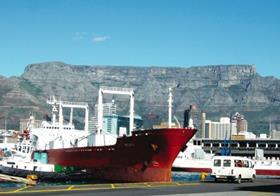
Hopes that container shipping out of South Africa's ports would resume from this weekend onwards have been dashed following the news that Transnet workers have rejected the wage agreement drawn up by the negotiating teams yesterday (20 May).
It is now almost inevitable that the strike will last the full three weeks previously intended by the unions.
The strike is now causing critical damage to the export industry and South Africa's international trade. Business analysts say in some cases trade relations between South African companies and their international partners have suffered irreparable damage.
During the strike conventional reefer terminals have continued to operate and a number of additional reefer vessels have been chartered to move volumes which would otherwise have been shipped in containers.
The South African fruit industry is now reviewing its dependence on the monopolistic container terminal operations, and containerised exports in general.
During the strike the fruit industry has generally remained silent, but the recent decision by Maersk shipping company to impose a congestion surcharge on exporters because of the strike sent tempers flaring, with the government and the transport authority, Transnet, also being accused of putting the country's export programmes at risk. Fruit South Africa rejected the surcharge, asked exporters not to pay and referred Maersk to Transnet for the recovery of its losses.
CGA spokesman Justin Chadwick confirmed today that the citrus industry would also ask its members and exporters shipping citrus from the country to reject surcharge.
'There has been a trend over the past ten years of increased container shipments at the cost of conventional shipments. There have been many factors that have driven this trend – with some predicting an eventual end to conventional shipments. From an industry point of view I believe that choice is good – a mix of conventional and container shipments allows for competition and reasonable pricing,' said Mr Chadwick.
'Should shipments go 100% in containers the industry would be at the mercy of container lines in terms of shipping rates and terms and conditions of shipping,' he added. 'The container shipping rates may be attractive now – but perhaps this is buying market share to drive out conventional competition; and when that option is gone then a hike in container rates could follow.
Mr Chadwick noted that the advantage of choice has been highlighted over the past two weeks during the Transnet strike. 'Conventional shipments have been marginally impacted by the strike, and as a result those markets serviced by conventional shipments have continued to receive fruit; while markets serviced by container shipments have not.'
There is now much concern over containers that have been stuck in the ports since the strike began, as well as the more sensitive products such as avocados which need to be shipped immediately after packing.
Leading avocado exporter Westfalia stopped packing for the export market last week and, along with other avocado shippers, could increasingly run into problems to fulfill their supply obligations.



